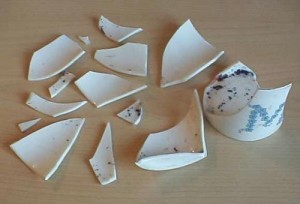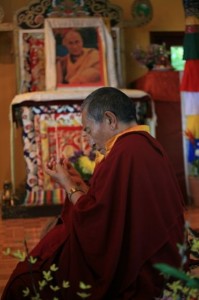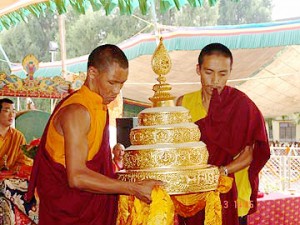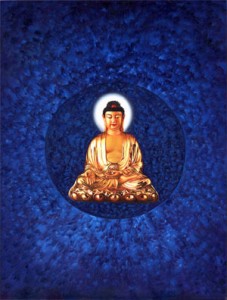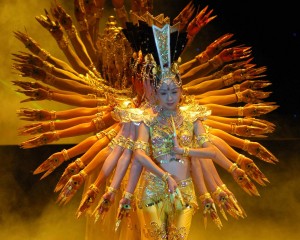
An excerpt from a teaching called Intimacy with the Path by Jetsunma Ahkon Lhamo
The path of Buddhadharma can only bring about the result that is consistent with and the same as, the seed or its essence. We’re looking at essence, we’re looking at movement and we’re looking at result. Try to imagine how we see things ordinarily. When we are doing what seems right, moving through linear time, isn’t it the case where if something happens to you—let’s say, your car breaks down—that’s it. The car broke down. It’s out there. It’s isolated. It has no connection with anything else. Did the car break down because you forgot to put oil into it? No, no. It just broke down. Did the car break down because you never gave it a checkup or a tune up? No, no, no. It just broke down. It just happened that way. Did the car stop because it had no gas in it? No, no. It just stopped. It’s that kind of thing. When we see events in our lives, we see them like that. They happen out there.
Now as time passes, often there are these connecting things that happen to the events in our lives. Maybe a year after the car broke down, several things might have happened. You might have learned something about how to take care of a car. Let’s say your husband or wife yelled at you for not taking care of the car and you learned because they yelled real, real loud! Or, let’s say a year after the car broke down, a series of events happened in which you were challenged, and you put in some overtime so that you could make some more money so you could get a new car. And so, a couple of years down the road, when you think about the day that car broke down, it’s no longer an isolated situation. The car didn’t just break down! It didn’t just happen. There is meaning and importance that is somehow connected with all of that.
You can see a movement from even before the car broke down, because by that time you have enough distance from the chaos of your mind to be willing to look at things that you weren’t looking at before. You can see that the car broke down, but you also know, in hindsight that in fact you didn’t take care of the car very well. But now you see this as a total learning process. It isn’t just that the car broke and you’re living with that horrible reality. You’re not seeing this isolated, neurotic situation. You’re seeing a trend, a movement. You didn’t know how to take care of the car. You didn’t do such a good job. The car broke down. Certain events happened by which you became naturally empowered to get another car, but that natural empowerment only happened because your first car disappeared. It broke.
So now, in retrospect, you’re seeing this slow, beautiful movement, which started with your incompetence and led to your empowerment. In retrospect, you can see the wholeness of it. Doesn’t that give you a clue as to how we think?
We have this kind of an ignorance that plagues us, a kind of short-sightedness. It’s not being able to understand whole pictures or abstract conceptualizations or how to see around things. I don’t know how better to describe it. So we only see something right in front of us and this is a kind of manic little posture we put ourselves in.
The path is like that also. From the point of view of Buddhahood, one can see the primordial basis, the ground, which is uncontrived, beginningless, endless, unfounded and perfectly complete – Buddha nature, the primordial wisdom state. We see that. We see a dance or a movement, which is very much like having the same relationship with the ground as the rays of the sun have with the sun. You can’t really say where the sun ends and the rays begin. There’s no real way to say that. There’s only a matter of opinion as to where one ends and the other begins. And so we understand that sun’s rays are the same reality as the sun itself.
In the same way, the BuddhaDharma is understood as this radiance or display, which is inseparable from the source. You can’t have sunlight without the sun. It doesn’t exist. They are married in the most intimate fashion. There’s no separation. This is seen from the point of view of Buddhahood. We see the primordial wisdom state. We see display as being inseparable from the natural resting state and we see this from the point of view of result, which is completely dependent on and based on the ground, the primordial wisdom state. In other words, if we did not have this primordial wisdom state, which is Buddhahood, there could be no result of Buddhahood. How would you accomplish it? You couldn’t build it out of sticks and stones. There would be no result.
So from the point of view of Buddhahood, this is seen as a three-legged stool or something that has three facets that are completely inseparable from one another. The idea of whether or not one should practice, of whether one should be spiritual today or not, the idea of becoming stagnant on the path would not be possible if we didn’t see the path as being something separate from us in such an essential way that it becomes something we either walk on or put on. Should one approach this particular problem in a spiritual way or do we simply let ourselves get away with it?
If we were to understand something of our own primordial nature, if we were to understand that the method is not separate from the result, then the hunger that we feel that brings us to the path would also sustain us. There is a hunger that brings us to the path. Something that makes us reach out, throughout the course of our lives. There is some kind of urging towards a natural, open, awakened state of wisdom and poise, a state that is free of the components of suffering. We know that there is something. We can feel it. There is a natural urge and yet, even with all that urging and all that crying out in our hearts which we all do in some way or another, why is it that we are not able to sustain ourselves on the path?
What I’m describing is a very strong and powerful need to have our understanding of our spiritual life be so natural, so connected, so married, with every primal impulse that we have towards spiritual growth that we move past the point of making a choice. That’s where you want to go on the spiritual path. You want to get past the point of needing to make that choice again and again, because so long as you have to re-choose and reaffirm your path, you’re going somewhere that isn’t you. You’re doing something you feel is separate from your nature. You’re doing something still that is unnatural and so all these dilemmas come into play.
We become impotent upon the path then and we get to the point where we need to be inspired on a regular basis, because when you’re traveling a journey that is separate from you, inspiration is necessary. On the other hand, do you need to be inspired to continue living, generally speaking? Do you need to be inspired to take your next breath? It’s true that sometimes we can fall into a confusion that is so thick and so deep that we don’t even understand whether we want to live anymore. That happens. There are people that commit suicide, but generally speaking most of us understand intuitively that life itself is simply a display of our nature. On some level we’re beginning to understand that in order to continue living we’ve got to engage in the method of breathing and moving through our lives.
If we could only do that with the path, if it could be seen as natural for us and as inseparable from us as our own breath, then practicing the Dharma would be much more potent, much more natural for us, much easier. Not easier in that you’d practice it in a schlocky way, or you would practice it without really caring how well you do. Easy in the sense that it becomes as natural as scratching an itch or as natural as the intuitive knowledge that if you want to get out of bed in the morning you’ve got to swing your legs over the edge. It’s such a natural movement.
But that’s not how we practice Dharma. We practice Dharma like it’s a big issue, something we have to do that is not us, a girdle that we have to put on, a thing that we have to suffer through, a ritual that we have to impress somebody with, something we have to set aside time for. And ultimately, we lose touch with and have no sense of what it actually is to to live in spirit, to live a sacred life.
© Jetsunma Ahkon Lhamo,


